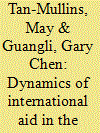|
|
|
Sort Order |
|
|
|
Items / Page
|
|
|
|
|
|
|
| Srl | Item |
| 1 |
ID:
159605


|
|
|
| 2 |
ID:
116490


|
|
|
|
|
| Publication |
2012.
|
| Summary/Abstract |
Environmental degradation in China, intensified by open-door reforms and industrialization, has been increasing at an alarming scale. Domestically, environmental governance has been poor, often due to institutional constraints and lack of "good practices." However, recently there have been studies on how the "foreign factor" might have profound positive effects on capacity building in China and how international actors could lead to the successful introduction of good environmental governance. In this article, we present a study of a successful case: the World Bank Global Environmental Facility Cixi Wetlands project in Ningbo, China. The article examines the following: (a) the unique local context enabling the diffusion of international norms; (b) the factors which contribute to the World Bank's leverage role in restructuring local project governance; and (c) the changes in local environmental governance arising from the Bank's involvement. By evaluating this project, the article will demonstrate how the World Bank managed to introduce and socialize local actors into project-specific policy dialogues and procedures that enhanced local compliance with its international practices and standards.
|
|
|
|
|
|
|
|
|
|
|
|
|
|
|
|
| 3 |
ID:
153353


|
|
|
|
|
| Summary/Abstract |
Hydropower dams are back in the spotlight owing to a shifting preference for low carbon energy generation and their possible contribution to mitigating climate change. At the forefront of the renaissance of large hydropower dams are Chinese companies, as the builders of the world's largest dams at home and abroad, opening up opportunities for low- and middle-income countries. However, large hydropower dams, despite their possible developmental and carbon reduction contributions, are accompanied by huge economic costs, profound negative environmental changes and social impacts. Using fieldwork data from four hydropower projects in Ghana, Nigeria, Cambodia and Malaysia, this paper evaluates the behaviour of Chinese stakeholders engaged in large hydropower projects in Asia and Africa. We do this by first exploring the interests of the different Chinese stakeholders and then by investigating the wider implications of these Chinese dams on the local, national and international contexts. The paper concludes that hydropower dams will continue to play a prominent role in future efforts to increase energy security and reduce energy poverty worldwide, therefore the planning, building and mitigation strategies need to be implemented in a more sustainable way that takes into account national development priorities, the needs of local people and the impacts on natural habitats.
|
|
|
|
|
|
|
|
|
|
|
|
|
|
|
|
| 4 |
ID:
178462


|
|
|
|
|
| Summary/Abstract |
Typhoon Yolanda brought major devastation to the local communities and infrastructure and also reshaped social structures and networks in the Philippines. During the immediate recovery process, bridging, bonding and linking social capital have had differential impacts and outcomes on how communities cope with the aftermath of the disaster. This article investigates the interplay between the various types of social capital and their contributions to immediate coping strategies of Typhoon Yolanda communities. This article also evaluates the complexity of defining social capital in a disaster context. In particular, it unpacks the blurring of the bridging and linking social capital at the immediate stage of rehabilitation in a post-disaster context and its impacts on the social fabric of the communities. We deduce from this case study the social capital strategies necessary for a speedy recovery process both economically and socially for disaster-affected communities.
|
|
|
|
|
|
|
|
|
|
|
|
|
|
|
|
| 5 |
ID:
083621


|
|
|
|
|
| Publication |
2008.
|
| Summary/Abstract |
Abstract: Drawing on field work in Southern Thailand undertaken in July 2005, the study illuminates the complex and contingent way in which the Indian Ocean tsunami of December 2004 affected communities, households and individuals. The paper problematises the indiscriminate/discriminate patterning of impact and recovery and also makes a case for a delocalised and transnational approach to understanding the impacts of the wave. Using the notion of 'tsunami footprints' and drawing on qualitative interviews, the paper proposes that impacts need to be seen in the context of the spatially dispersed networks of association that characterise the Thai space economy and Thai society. Drawing on work on poverty dynamics, the paper also explores three explanatory disjunctures in recovery transitions: the disjuncture between the pre-tsunami context and the post-tsunami situation; the disjuncture between structure and agency; and the disjuncture between the appearance of progressive and gradual change in societies and the lived reality of turbulence
|
|
|
|
|
|
|
|
|
|
|
|
|
|
|
|
| 6 |
ID:
084422


|
|
|
|
|
| Publication |
2008.
|
| Summary/Abstract |
Abstract: Drawing on field work in Southern Thailand undertaken in July 2005, the study illuminates the complex and contingent way in which the Indian Ocean tsunami of December 2004 affected communities, households and individuals. The paper problematises the indiscriminate/discriminate patterning of impact and recovery and also makes a case for a delocalised and transnational approach to understanding the impacts of the wave. Using the notion of 'tsunami footprints' and drawing on qualitative interviews, the paper proposes that impacts need to be seen in the context of the spatially dispersed networks of association that characterise the Thai space economy and Thai society. Drawing on work on poverty dynamics, the paper also explores three explanatory disjunctures in recovery transitions: the disjuncture between the pre-tsunami context and the post-tsunami situation; the disjuncture between structure and agency; and the disjuncture between the appearance of progressive and gradual change in societies and the lived reality of turbulence.
|
|
|
|
|
|
|
|
|
|
|
|
|
|
|
|
| 7 |
ID:
152793


|
|
|
|
|
| Summary/Abstract |
Climate change adaptation refers to altering infrastructure, institutions or ecosystems to respond to the impacts of climate change. Least developed countries often lack the requisite capacity to implement adaptation projects. The Global Environment Facility’s Least Developed Countries Fund (LDCF) is a scheme where industrialised countries have disbursed $934.5 million in voluntary contributions to support 213 adaptation projects across 51 least developed countries. But how effective are its efforts—and what sort of challenges have arisen as it implements projects? To provide some answers, this article documents the presence of four “political economy” attributes of adaptation projects—processes we have termed enclosure, exclusion, encroachment and entrenchment—cutting across economic, political, ecological and social dimensions. Based on extensive field research, we find the four processes at work simultaneously in our case studies of five LDCF projects being implemented in Bangladesh, Bhutan, Cambodia, the Maldives and Vanuatu. The article concludes with a discussion of the broader implications of the political economy of adaptation for analysts, program managers and climate researchers at large. In sum, the politics of adaptation must be taken into account so that projects can maximise their efficacy and avoid marginalising those most vulnerable to the impacts of climate change.
|
|
|
|
|
|
|
|
|
|
|
|
|
|
|
|
| 8 |
ID:
136558


|
|
|
|
|
| Summary/Abstract |
There is increasing evidence that corporate social responsibility (CSR) is emerging as a management issue within Chinese business (Moon and Shen 2010; Yin and Zhang 2012). The main drivers of this movement, which are commonly discussed, include domestic political will and international pressure. However, what is less understood is
the nature of the shaping of CSR. As a concept, CSR has been widely interpreted as the way companies take into account interests of a broader range of stakeholders beyond owners and shareholders of the firm. Hence, it is about the way firms develop policies and practices to minimize the negative impacts and even increase the positive impacts of their business practices on various stakeholder groups. In a Western context, the rationale for CSR has been explained as a result of interaction between business, government and society where institutional pressures that develop from these interactions lead to certain expectations regarding the nature of business practices. This is where firms increasingly see CSR as a strategic approach to maintaining and enhancing legitimacy and reputation so as to ensure the buy-in and loyalty of key stakeholder groups such as employees and customers.
|
|
|
|
|
|
|
|
|
|
|
|
|
|
|
|
| 9 |
ID:
136559


|
|
|
|
|
| Summary/Abstract |
China’s insatiable appetite for natural resources and energy to fuel its national growth is having an increasing impact on the domestic and global environment. Globally, China has turned to resource-rich regions in Africa and South America, at times engaging so-called “rogue states” to secure the resources it requires. Now is a critical juncture at which to encourage socially responsible behaviours in the Chinese extractive sectors, such as adopting the Extractive Industries Transparency Initiative (EITI). This analysis discusses the current corporate social responsibility (CSR) mechanisms in extractive industries and assesses the feasibility of socialising China towards adopting CSR global norms in the extractive industries. This article has three sections. The first discusses China’s environmental governance trajectory and ecological footprint in the domestic and global extractive industry. The second section discusses the factors contributing to the success and failure of various CSR mechanisms, with a specific focus on the EITI, and the final section expounds on the emerging challenges and issues and concludes with policy
|
|
|
|
|
|
|
|
|
|
|
|
|
|
|
|
| 10 |
ID:
068985


|
|
|
|
|
|
|
|